¿qué estás buscando?
Al considerar tornillos de tierra para instalaciones de paneles solares , un factor importante a considerar es su resistencia a las duras condiciones climáticas. Los tornillos de tierra a menudo se eligen por su estabilidad, instalación rápida y un impacto ambiental mínimo. Pero, ¿qué tan bien se mantienen en clima extremo? En esta publicación de blog, examinaremos la durabilidad de los tornillos de tierra en diferentes condiciones climáticas y explicaremos por qué son una solución confiable para las instalaciones solares.

Los tornillos de tierra

 Xiamen TopFence Co.,Ltd.
Xiamen TopFence Co.,Ltd. No. 77, LingXia South Road, Huli District, Xiamen City, Fujian, China
No. 77, LingXia South Road, Huli District, Xiamen City, Fujian, China Teléfono: +8613365923720
Teléfono: +8613365923720
 Correo electrónico: info@xmtopfence.com
Correo electrónico: info@xmtopfence.com
 IPv6 red compatible Mapa del sitio
| XML
| Blog
| Política de privacidad
IPv6 red compatible Mapa del sitio
| XML
| Blog
| Política de privacidad


